| Srl | Item |
| 1 |
ID:
128435
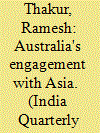

|
|
|
|
|
| Publication |
2013.
|
| Summary/Abstract |
The ebb and flow of coping with Australia's identity dilemma as a European settler society located on the geographical edge of Asia leads to bouts of agonising, excitement and temporising. This has been given particular cogency with the power shift underway from the trans-Atlantic to the Asia-Pacific. The 2012 White Paper set 25 national objectives to be met by 2025, with targets ranging from improving trade links and increasing scholarships to teaching priority Asian languages. But in this transactional embrace of Asia that highlights economic and trade links, gaps might open up between ambition and delivery, especially amidst continuing evidence of insensitivity to how Asians forge lasting relationships. Ties with China are dominated by trade but security concerns remain. Relations with India should improve with the removal of the nuclear issue as an irritant and growing trade and tourist numbers. Japan remains an important trade and diplomatic partner. And geography and demography ensure that Indonesia is no less important to Australia than Asia's big three.
|
|
|
|
|
|
|
|
|
|
|
|
|
|
|
|
| 2 |
ID:
084948


|
|
|
| 3 |
ID:
130609
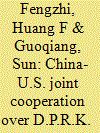

|
|
|
|
|
| Publication |
2014.
|
| Summary/Abstract |
In February 12, 2013, North Korea announced it had successfully Conducted its third underground nuclear test. After such a dangerous move, the U.S. and South Korea tightened their bilateral security cooperation and beefed up defense measures. This caused tensions to escalate on the Korean Peninsula, and the situation appeared to spin out of control. The crisis pushed China and the U.S. together to work on this issue. This article will analyze those deep-seated factors affecting bilateral cooperation and make an initial exploration 'of its prospects while providing an overview of their joint actions to solve the North Korean nuclear issue.
|
|
|
|
|
|
|
|
|
|
|
|
|
|
|
|
| 4 |
ID:
179789


|
|
|
|
|
| Summary/Abstract |
The Iranian nuclear programme is a controversial issue that has had domestic, regional and international effects. Iran’s pursuit of nuclear technology has divided the Middle East region and international community. Turkey has been at the centre of the Iranian nuclear debate and has sought to play a ‘mediating role’ in this issue. This article will apply a Historical Sociological (HS) framework to analyse Turkey-Iran relations considering the Iranian Nuclear Issue. It will explore the period from 2002 until the signing of the Joint Comprehensive Plan of Action (JCPOA) in July 2015 and will provide an analysis of the historical, domestic and regional/international developments in the nuclear issue and how this has affected Turkish-Iranian relations. By highlighting the continuities and constraints each actor has faced, this article will demonstrate how the interaction of structure versus agency, geographical determinants and historical analysis all help provide a comprehensive understanding of the constraining and enabling factors in Turkish-Iranian relations. By applying Historical Sociology and ‘Cuspness’ to Turkish-Iranian relations in the Iranian Nuclear Issue, this article provides the reasons of ‘how’ and ‘why’ the relationship is complex, and how Turkey and Iran can maintain pragmatic relations yet be constrained by these factors at the same time.
|
|
|
|
|
|
|
|
|
|
|
|
|
|
|
|
| 5 |
ID:
142979


|
|
|
|
|
| Summary/Abstract |
The inability of the South Asian nuclear rivals to resolve their disputes is more than a tragic failure. Their nuclear weaponry changes the nature of their disputes and makes them a global concern. The three books reviewed here stress different aspects of the India–Pakistan nuclear challenge and reveal a new wave of creativity in assessments of the causes and most promising solutions to restraining regional nuclear dangers. They do not advocate the subcontinent's denuclearization, but they make an important contribution to our understanding of the India–Pakistan nuclear conundrum, a prerequisite to bring South Asia's nuclear arms control back to the international agenda. All agree that solutions must be based on domestic willingness, but they see vital roles for elevated international pressure. Cohen and Riedel examine the potential role of China in the settlement of Indo-Pakistani disputes, and all agree that China's nuclear and missile assistance to Pakistan has had a negative impact on Indo-Pakistani relations. They all show growing interest in rethinking United States policy toward South Asia, looking at the region as a whole and integrating China into the picture, in order to adopt a comprehensive regional strategy to prevent a nuclear Armageddon in South Asia.
|
|
|
|
|
|
|
|
|
|
|
|
|
|
|
|
| 6 |
ID:
105661
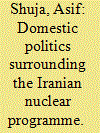

|
|
|
| 7 |
ID:
130261
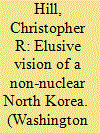

|
|
|
|
|
| Publication |
2013.
|
| Summary/Abstract |
Any president1 at the start of a new term will survey international problems and find a few requiring urgent attention. Some will be new, perhaps even emerging after the 2012 political campaign, but others are like hardy perennials, returning year after year. In 2013, one of these problems is North Korea and its aspirations to be a nuclear weapons state. The longer the problem of North Korea's nuclear issue remains, the more the world becomes inured to it, and might become inclined to live with it. North Korea's ambition to develop nuclear weapons, however, is a threat to peace and security-especially in the region. If successful in developing a deliverable nuclear weapons system (i.e. miniaturized and integrated with a working missile), North Korea would make a mockery of the already struggling nuclear Non-proliferation Treaty (NPT), as well as invite a regional arms race.
|
|
|
|
|
|
|
|
|
|
|
|
|
|
|
|
| 8 |
ID:
092618
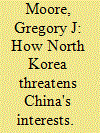

|
|
|
| 9 |
ID:
144655
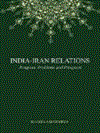

|
|
|
|
|
| Publication |
New Delhi, KW Publishers Pvt Ltd, 2016.
|
| Description |
xiv, 417p.: tables, figures, mapshbk
|
| Standard Number |
9789383649761
|
|
|
|
|
|
|
|
|
|
|
|
Copies: C:1/I:0,R:0,Q:0
Circulation
| Accession# | Call# | Current Location | Status | Policy | Location |
| 058635 | 327.54055/ASH 058635 | Main | On Shelf | General | |
|
|
|
|
| 10 |
ID:
106301


|
|
|
|
|
| Publication |
2011.
|
| Summary/Abstract |
Three broad policy determinants can be discerned in Indian reactions to the Iranian nuclear issue. These include: 'strategic autonomy' as it relates to Indian foreign policy decision making; concerns regarding 'regional strategic stability' as it relates to events in its 'proximate neighbourhood'; and 'national security' implications on account of operative clandestine proliferation networks. Issues relating to the role of the US in influencing Indian policy positions at international forums and vis-à-vis domestic policy were prominent as regards the first determinant. Threats and 'advice' by American policy makers and law makers on specific issues like the Indo-US nuclear deal and the Iran-Pakistan-India gas pipeline gave further grist to critics. However, an analysis of India's concerns regarding the other two policy considerations, i.e., strategic stability and national security were 'real and present' and also dominated public discourse as well. With India having become a non-permanent member of the UN Security Council from January 2011, it should be the task of Indian diplomacy, at the UNSC as well as at other bilateral and multilateral settings, to help expand the space for the application of 'satisfactory strategies' and reduce the range of 'unsatisfactory strategies' (the latter being the then Foreign Secretary Menon's term to describe America's options vis-à-vis the issue as revealed in a WikiLeaks cable)
|
|
|
|
|
|
|
|
|
|
|
|
|
|
|
|
| 11 |
ID:
110471


|
|
|
| 12 |
ID:
182903


|
|
|
|
|
| Summary/Abstract |
SIGNALS from Washington on the readiness of the Joe Biden administration to consider the possibility of concluding a new international nuclear deal with Tehran raised certain hopes for unblocking the situation around Iran. Positive forecasts were also expressed in Iran...
|
|
|
|
|
|
|
|
|
|
|
|
|
|
|
|
| 13 |
ID:
111977
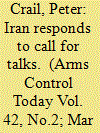

|
|
|
| 14 |
ID:
100622


|
|
|
| 15 |
ID:
080145
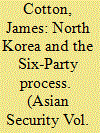

|
|
|
|
|
| Publication |
2007.
|
| Summary/Abstract |
This paper traces the development of the Six-Party process through to the joint statement by the parties on September 19, 2005, considers the subsequent decision by North Korea to stage a nuclear test in the context of the apparent stasis of the process, and then reviews the international condemnation that was the result of those tests. North Korea's decision to return to the talks is then discussed in light of the policy issues that must be solved if the September 19 principles can be realized in practice.
|
|
|
|
|
|
|
|
|
|
|
|
|
|
|
|
| 16 |
ID:
117671


|
|
|
| 17 |
ID:
098046


|
|
|
| 18 |
ID:
126061
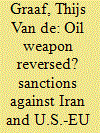

|
|
|
| 19 |
ID:
169223
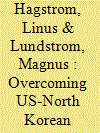

|
|
|
|
|
| Summary/Abstract |
Periods of mutual enmity in US-North Korean relations are typically interrupted by more conciliatory gestures. How can the many twists and turns in this relationship be explained and hopefully overcome so that more long-lasting détente is accomplished? Drawing eclectically on realism and constructivism, we conclude that a nuclear deal should address not only North Korea’s interests in security and regime survival, but also its status concerns. Applying the same theories to the other part of the dyad – the US – we conclude that it may now have material interests in ameliorating the relationship, but that such a development requires US foreign policy discourse to cease depicting North Korea as “irrational” and “evil”.
|
|
|
|
|
|
|
|
|
|
|
|
|
|
|
|
| 20 |
ID:
094268
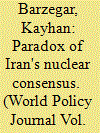

|
|
|